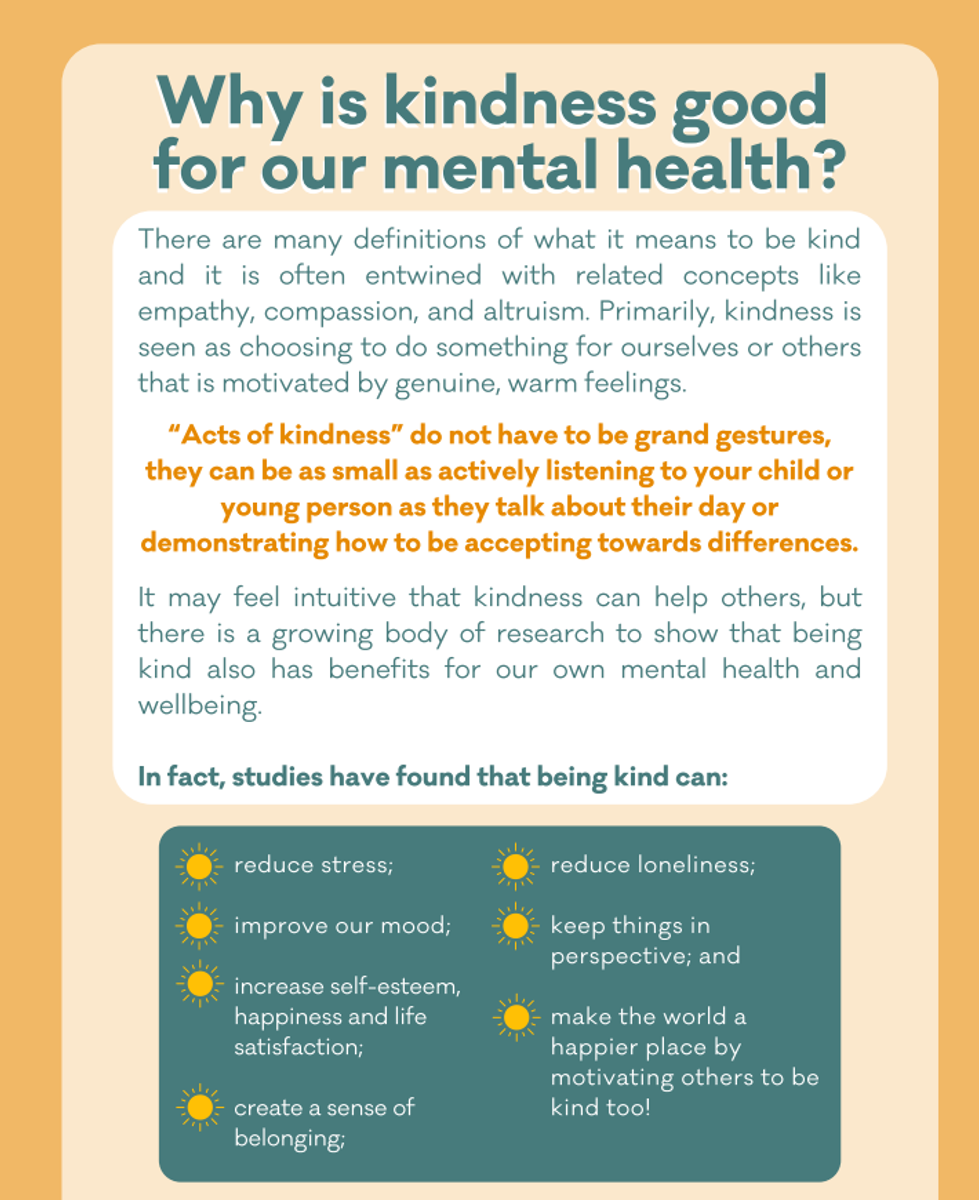Principal Parenting News

Parent Corner
Kindness ~
How to Teach Empathy and Kindness to Children: A Parent’s Guide
Empathy and kindness are essential qualities that help children build positive relationships and navigate social situations.
By teaching your child empathy and kindness, you can help them understand and connect with others and become a caring and compassionate individual.
Here are some tips for parents on how to teach empathy and kindness to children.
Lead by Example
Children learn by observing the behaviour of those around them, so it’s essential to lead by example.
Practice empathy and kindness in your interactions with others, including your children. Model behaviours such as active listening, compassion, and generosity.
Teach Perspective-Taking
Empathy requires the ability to understand another person’s perspective. Teach your child to see things from another person’s point of view by asking them to imagine how the other person might feel in a particular situation.
Encourage your child to consider the thoughts and feelings of others and how their actions might impact them.
Practice Active Listening
Active listening is an essential component of empathy. Teach your child to listen attentively to others and respond with care and understanding.
Encourage your child to ask questions and show interest in what others have to say.
Encourage Kindness and Gratitude
Teach your child the importance of kindness and gratitude by modelling these behaviours and encouraging them in your child.
Encourage your child to do small acts of kindness for others, such as holding the door or offering to help someone who is struggling.
Practice gratitude by encouraging your child to appreciate the positive things in their life and expressing gratitude for the kindness of others.
Use Storytelling
Storytelling can be a powerful tool for teaching empathy and kindness to children. Reading books with positive messages about empathy and kindness can help children understand these concepts in a concrete and relatable way.
Use storytelling to teach your child about the value of kindness, the importance of empathy, and how to show compassion for others.
Practice Problem-Solving
Teach your child how to solve problems in a positive and constructive way. Encourage them to think about how they would feel in a particular situation and how they might respond to the feelings of others.
Practice problem-solving with your child by role-playing different scenarios and encouraging them to come up with creative solutions.
Teach Respect and Inclusivity
Teach your child to respect and value all individuals, regardless of their differences. Encourage your child to embrace diversity and inclusivity by exposing them to a range of people and cultures.
Teach your child about the value of treating others with respect and dignity, regardless of their race, gender, or background.
Teaching empathy and kindness to children is a crucial part of their development.
Leading by example, teaching perspective-taking, practising active listening, encouraging kindness and gratitude, using storytelling, practising problem-solving, and teaching respect and inclusivity, parents can help their children become caring and compassionate individuals.
Remember, teaching empathy and kindness is an ongoing process that requires patience, practice, and consistency, but it’s well worth the effort.
By helping your child develop these essential qualities, you can help them build positive relationships and become a positive force in the world.
Questions to Ask Your Child
- How does it make you feel when someone is kind to you? How can you show kindness to your friend, brother or sister/family?
- How can you be a good friend?
- How can you include others?
Some great resources for Families can be found here ~
https://theresilienceproject.com.au/at-home/home-2023/
https://www.smilingmind.com.au/
School Philosophy ~ Who we are and what we do at St. Mel's
Below is an extract from our Learning Philosophy…
Playful learning to inquiring minds,
Inquiring minds to cooperative learners,
Cooperative learners to self directed individuals.
Developing creativity through learning.
At St Mel’s we acknowledge that the child is a capable person and is able to make meaning of their world around them. A Community of Inquiry is one that is committed to engaging in all learning opportunities through an inquiry approach. The language and phases of inquiry associated with this approach are paramount to its success. Learners are immersed in and experience the process of Tuning In, Finding Out, Sorting Out and Taking action. As part of this process, learners are required to engage with each other as researchers, thinkers, collaborators, communicators and self-managers. These are referred to as learning assets. Further to these assets we wish to nurture certain dispositions such as being curious, courageous, open-minded, flexible, persistent, resilient, responsible, reflective, empathetic, compassionate, reliable, confident, responsive, respectful and resourceful. These assets and dispositions are not learnt overnight but they are nurtured through the learning opportunities that are masterfully facilitated by expert educators who listen attentively to student voice, in other words, your son or daughter's teachers.
As Kath Murdoch, a leading educational consultant on whom we base much of our learning and teaching says, ‘Teachers who use inquiry-based methodologies have a firm belief in the transformative power of ownership. When students feel they are the ones ‘doing the learning’ rather than the teacher ‘doing the learning to them’ they are undoubtedly more engaged, and with engagement comes increased potential for learning’ (Murdoch, 2015).
This approach is far from an afternoon of integrated learning. A community of Inquiry is totally committed to engaging in an inquiry approach in all learning. Such an approach captures much of the educational literature that promotes lifelong learning and what are called 21st century competencies such as being adaptable and flexible to new information, being creative and being able to solve and consider real-world problems. Through these competencies, we hope all students graduating from St Mel’s are equipped with the skills, attitudes and social attributes necessary to have a successful and rewarding life.
Your child’s teachers are the experts and are more than happy to discuss with you, at any time, your child’s education, setting goals and working towards developing the assets they need to be successful contributors to society.

